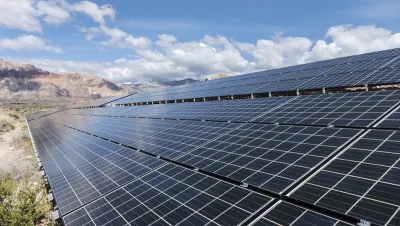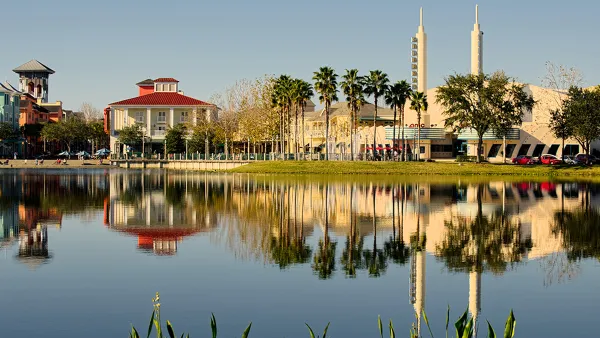Casinos are energy intensive and often located in areas with specific resource constraints and surpluses (i.e., Las Vegas), thus they offer a perfect case study for the future of solar energy.

Tovin Lapan offers an in-depth examination of the current state of electricity production in Las Vegas—where casinos and other consumers are looking for flexible options for producing solar energy.
The continued emergence of solar power, however, is "a growing predicament for power companies," according to Lapan. "While corporations are motivated to 'go green,' their push to be more energy efficient leaves the utility with less revenue to maintain the grid and can lead to rate increases. This can cause what energy market observers call the 'death spiral.'"
In Las Vegas, the state-regulated energy monopoly goes by the name NV Energy. With Las Vegas' large companies and surplus of sunshine, NV Energy is challenged by a constant pressure from companies seeking to generate energy on their own land, and on their own terms. "Confronted with increased use of solar power as the systems become more affordable, the company has moved to stabilize revenue," writes Lapan. "Earlier this year, NV Energy decreased the amount it pays residential owners of solar arrays for excess electricity they send into the grid, causing a public outcry."
One way state regulators have attempted to mitigate the impact of distributed solar is by charging an exit fee. The fee is designed to "stave off rate hikes for the remaining customers."
Companies like MGM and Wynn have already decided to pay the exit fee, with others planning to follow suit. Even the city of Las Vegas (located outside famous "Strip" that most people think of as the city) has set a goal to power all municipal buildings and public spaces with renewable energy by 2017. "It too must get PUC approval for its plan though," writes Lapan, "and the commission has mandated the city purchase the bulk of its electricity from one of NV Energy’s solar facilities."
FULL STORY: Why Some Las Vegas Casinos Are Gambling on Solar

Analysis: Cybertruck Fatality Rate Far Exceeds That of Ford Pinto
The Tesla Cybertruck was recalled seven times last year.

National Parks Layoffs Will Cause Communities to Lose Billions
Thousands of essential park workers were laid off this week, just before the busy spring break season.

Retro-silient?: America’s First “Eco-burb,” The Woodlands Turns 50
A master-planned community north of Houston offers lessons on green infrastructure and resilient design, but falls short of its founder’s lofty affordability and walkability goals.

Test News Post 1
This is a summary

Analysis: Cybertruck Fatality Rate Far Exceeds That of Ford Pinto
The Tesla Cybertruck was recalled seven times last year.

Test News Headline 46
Test for the image on the front page.
Urban Design for Planners 1: Software Tools
This six-course series explores essential urban design concepts using open source software and equips planners with the tools they need to participate fully in the urban design process.
Planning for Universal Design
Learn the tools for implementing Universal Design in planning regulations.
EMC Planning Group, Inc.
Planetizen
Planetizen
Mpact (formerly Rail~Volution)
Great Falls Development Authority, Inc.
HUDs Office of Policy Development and Research
NYU Wagner Graduate School of Public Service



























